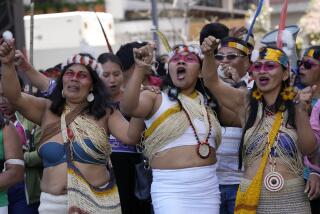THE WORLD - News from June 19, 2009
LIMA, PERU â Peruâs Congress voted Thursday to revoke two laws enacted last year to open the Amazon to mining, oil and timber development, measures that enraged many indigenous groups and led to a bloody confrontation this month.
Legislators acted at the behest of President Alan Garcia, who went on national television Wednesday to acknowledge that he had committed a âseries of errors and exaggerationsâ in pushing economic policies that spawned a wave of protests by indigenous groups, including road blockades and takeovers of two airports.
A government attempt on June 5 to clear one of the blocked roads in the northeastern Amazonian town of Bagua led to a violent confrontation. Officials said 10 civilians and 23 police officers were killed, with one officer missing and presumed dead.
After the vote, Daisy Zapata, president of the umbrella indigenous rights group known as AIDESEP, called on member groups to immediately lift all roadblocks. It was not clear late Thursday whether they had done so.
âWe have shown Peru and the world that we are capable of dialogue, of unity, of observing human rights,â said Lidia Rengifo, an indigenous leader. âWe want an end to blood baths.â
Garcia has moderated his rhetoric since the violence, which he had blamed on indigenous residents and foreign agitators. Shortly after the clash, he issued an arrest warrant for Indian leader Alberto Pizango, who said he was being made a scapegoat and has since been granted political asylum in Nicaragua.
Garcia said Wednesday night that he preferred âcorrection to stubborn obstinacy to see who wins.â
Legislators voted 82 to 14 to repeal the two decrees, which were among 90 measures Garcia signed into law last year using temporary power granted by Congress to meet preconditions for a trade agreement. The U.S.-Peru free trade agreement went into effect this year.
Garcia framed the laws as measures that would bring formality and order to rampant illegal logging and mining in the Amazon. They were consistent with his view that opening the country to foreign investment is key to economic growth.
But indigenous groups said the laws sanctioned land grabs, abrogated their territorial rights and were promulgated with no consultation.
The Bagua incident pitched the government into its worst crisis, hurt Peruâs image abroad and raised fears that the Amazonian indigenous communities, with a total population of about 400,000, could become radicalized.
The crisis has also strained relations with neighbor Bolivia. In an interview Wednesday, Prime Minister Yehude Simon accused Bolivian President Evo Morales, an Aymara Indian, of inciting Peruâs groups by urging them in a letter to proceed with ârevolution.â
Simon has tendered his resignation, but there were signs that he would be asked to stay to head a reconciliation effort.
Indigenous groups that have blocked the key Tarapoto-Yurimaguas road connecting northern Pacific ports with Brazil told The Times this week that they wanted several other decrees signed by Garcia in the last year revoked before they reopened the road.
Opposition party leader Freddy Otarola told reporters after the vote that seven other decrees are âunconstitutionalâ and also should be revoked.
There were scattered signs of continued conflict this week. In the southern Andean province of Andahuaylas, where Indians took over the regional airport, an estimated 1,000 peasants briefly held several local mayors, saying they didnât support their cause.
More to Read
Sign up for Essential California
The most important California stories and recommendations in your inbox every morning.
You may occasionally receive promotional content from the Los Angeles Times.










